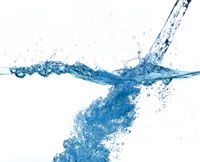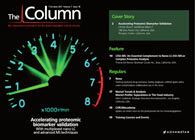Water contamination collaboration
Agilent Technologies will collaborate with Dr Shane Snyder ? an internationally recognized authority on water contamination from the University of Arizona?s Department of Chemical and Environmental Engineering ? and the university?s BIO5 Institute to develop new methods of detecting emerging contaminants in water, according to a company press release.

Agilent Technologies will collaborate with Dr Shane Snyder — an internationally recognized authority on water contamination from the University of Arizona’s Department of Chemical and Environmental Engineering — and the university’s BIO5 Institute to develop new methods of detecting emerging contaminants in water, according to a company press release.
Emerging contaminants can include pharmaceuticals, personal care products and other commonly used substances. The collaboration aims to increase the ability to accurately detect contamination in water supplies.
Dr Snyder commented that the partnership with Agilent will allow the University of Arizona to more effectively influence water reuse and desalination strategies by ensuring that the required water quality has been achieved for its intended use.
“Not only will we investigate known potential threats to water quality, we will also bridge the gap between detection and health by developing methodologies that can screen water for toxicity from multiple compounds,” he said.
The concept of addressing contaminants in potable water as mixtures — instead of separate chemicals— is of great interest to the regulatory, scientific and public communities.
The collaboration will be centered at the BIO5 Institute on the University of Arizona campus, where the infrastructure for cross-disciplinary work combining biological and chemical research already exists.
The BIO5 Institute at the University of Arizona mobilizes top researchers in five disciplines — agriculture, engineering, medicine, pharmacy and basic science — to find solutions to important health and environmental problems.
For more information, visit www.engineering.arizona.edu, www.bio5.org or www.agilent.com
This story originally appeared in The Column. Click here to view that issue.
New TRC Facility Accelerates Innovation and Delivery
April 25th 2025We’ve expanded our capabilities with a state-of-the-art, 200,000 sq ft TRC facility in Toronto, completed in 2024 and staffed by over 100 PhD- and MSc-level scientists. This investment enables the development of more innovative compounds, a broader catalogue and custom offering, and streamlined operations for faster delivery. • Our extensive range of over 100,000 high-quality research chemicals—including APIs, metabolites, and impurities in both native and stable isotope-labelled forms—provides essential tools for uncovering molecular disease mechanisms and exploring new opportunities for therapeutic intervention.
New Guide: Characterising Impurity Standards – What Defines “Good Enough?”
April 25th 2025Impurity reference standards (IRSs) are essential for accurately identifying and quantifying impurities in pharmaceutical development and manufacturing. Yet, with limited regulatory guidance on how much characterisation is truly required for different applications, selecting the right standard can be challenging. To help, LGC has developed a new interactive multimedia guide, packed with expert insights to support your decision-making and give you greater confidence when choosing the right IRS for your specific needs.

.png&w=3840&q=75)

.png&w=3840&q=75)



.png&w=3840&q=75)



.png&w=3840&q=75)











